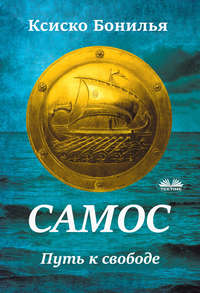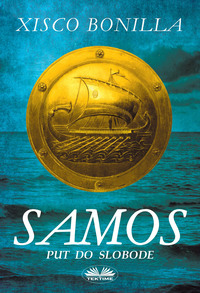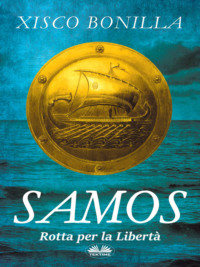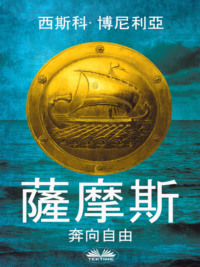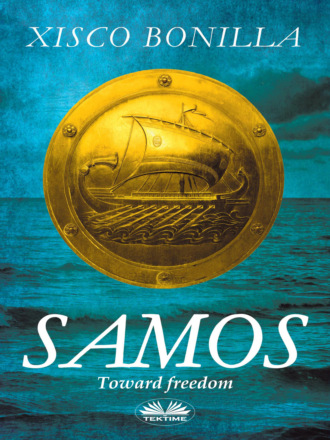
Полная версия
Samos

SAMOS
Toward freedom
Xisco Bonilla
Samos
First Edition in English, 2021
© Francisco Bonilla Garriga
Translator for the English version: Megan Elliott
First Edition in Spanish, 2017
Mundopalabras - Spain
© Francisco Bonilla Garriga
contacto@xiscobonilla.com
https://xiscobonilla.es
https://www.facebook.com/xiscobonillaescritor
www.instagram.com/xiscobonilla_escritor
The total or partial reproduction of this book, nor its incorporation into a computer system, nor its transmission in any form or by any means, be it electronic, mechanical, by photocopying, recording or other methods, without prior permission and in writing of its author. The infringement of the aforementioned rights may constitute a crime against intellectual property (Article 270 and following of the Spanish Penal Code).
To my wife, Marina, the best companion and friend with whom to enjoy this rich journey that life is, and to my daughters, Ana and Marta, who with their unconditional support have made this book possible.
Xisco Bonilla Garriga
SAMOS
Toward freedom
Index
I
II
III
IV
V
VI
VII
VIII
IX
X
XI
XII
XIII
XIV
XV
XVI
XVII
GLOSSARY
DRAMATIS PERSONAE
I
“Wake up!” Magon heard amid an anarchy of cries and sounds that kicked him out of his deep sleep. "Wake up at once!" He recognized the distressing voice of his partner and opened his eyes.
“What's the matter? What's with all the fuss?” he asked as he rubbed his eyes.
“The Romans! They’ve found us and are almost here”.
Magon, confused, looked sleepily at his companion, like he did not understand what was just said. And then, squinting, he saw the hustle and bustle around him. The cellar of the ship was a man's coming and going. He started to help, but a strong jolt threw him to the ground.
He did not know how long he was there, perhaps only briefly, but he stayed lying on the ground, covered in salt water, urine, and faeces from the bilge. He touched his sore head and opened his eyes again. Everything was dark and the murmur of the water revealed a huge gap in the ship’s hull. He uselessly sought out light from the lamps and instantly realised they would already be waterlogged. He looked up in search of the opening through which the cover was accessed. He focused his attention to searching for the access to the roof. The same voice that had awakened him called him again.
“Are you there, Magon?”
“Here, Ascipo!” He stretched his hand out in the direction of the voice until he found his partner's arm. “We’ve been attacked, we have to go on deck.”
“I think I broke my leg," Ascipo replied. “You need to leave; the ship is lost”.
“No chance,” Magon replied as he stood up in pain. He approached his partner and helped him get up. “Are we stranded? Are we close to the coast?” Magon asked as he led his friend toward the deck.
“No, we are still on the high seas.” Ascipo briefly paused to rest. The pain in his leg was unbearable. “When I came down a Roman ship was headed toward us. They have just hit us with their spur. Fortunately, not hard enough to sink us.”
They finally reached the small ladder that ascended to the deck. Magon peered out to ask for help, but he saw flurry of sailors and soldiers preparing to defend themselves against their attackers. He saw a face he recognized; Utibaal of Lixus passed by and decided to help. They both pulled Ascipo up, who, exhausted by the effort, sat down to examine his wound.
“You’re lucky,” Magon said, trying to cheer him up. “I don't think you’ve broken anything; it just looks like a piece of wood has sliced your thigh.”
“Let's go!” Utibaal interrupted. The merchant's face, incarnate and sweaty, looked ready to burst. “The Romans have returned!” he exclaimed as he pointed his arm toward the port side.
Magon joined and glanced over to where the Lixite pointed. It was still dark, but the moon lit up the clear sky far enough to see the silhouette of the Roman trireme outlined dismally on the black sea. Magon's muscles tensed and a prick of anguish ran through his body as he recognized the faces of those who had already killed his wife and children in Syracuse. Their persecutors did not want to sink them. They wanted to board them.
“Come on, Ascipo.” He helped join his friend. “Get up, we have to jump.”
The three men retreated toward the starboard and Magon looked back for a moment to confirm his dark thoughts. The Roman trireme was positioning itself to board the worthless ship and take its occupants as slaves. He grabbed Ascipo by the arm and looked into the black waters, begging his God, Eshmun, to keep them safe in his kingdom.
* * *
The lateen sail, held at port, fluttered slightly amidst the murmur of the whimsical waves that broke against the wooden hull and turned to foam on the extensive blue mantle that surrounded them.
“Careful! If the red scorpionfish bites you, you may not enjoy your tenth year,” Hermes reprimanded his son. The reddish fish jumped briskly on the deck with its open gills and thorns loaded with painful venom, erected to defend itself. Almices moved his bare foot out of the way just in time.
“I'm sorry, father,” the young man replied as the sailor’s leathery hands searched for his prey and armed with a pointed tamarind wood stick, skewered the dangerous fish, and placed it into a worn wicker basket.
“You need to be alert when gathering the nets! This has happened before and one day it’ll give you a good scare,” his father taught him affectionately. “It’s sting can be deadly. Remember the old Aristophanes who did not come back alive last year? It all depends on the amount of poison you get.”
"You're right, father," Almices tried to excuse himself. “But you know that what I'd like most is to be a soldier, so I can travel and discover new places.”
"I love the fresh breeze of the morning," Hermes replied changing the subject, as if he had not heard the irrational words of his son. “You don't know how lucky we are to live by the sea,” the tanned fisherman, already in his thirties, spoke to him with tenderness as he guided them toward the coast. He held the tiller firmly with one hand and with the other played with the line to keep the sail blowing in the wind. “The sensation of the waves splashing on my face makes all our efforts worth it. No adventure will make you happier, my son. Besides, a soldier's work is very unrewarding. There is no happiness or merit in taking the life of another human being.”
"That might be so, but I’d like to visit other places and I can’t think how else to do it, although I also like to fish," Almices added resigned. “And I like to sail too, especially when the wind pushes us fast, or when you tilt the boat so much that touching the water with your hands is effortless.”
"You're right, Almices; but don't tell your mother. God only knows she doesn't like us to play with our food.” The father smiled satisfied as he watched his son place the rest of the fish in the wicker baskets on the floor that had been caulked a thousand times with different types of wood, forming an irregular mosaic that was repeated throughout the boat. He had taught him well. He was sure that, if his wife let him, he could go fishing alone. “Come, take the tiller for a while. It’s not every day you turn ten years old and we have to celebrate. You’ve got to see the dinner that your mother is preparing for tonight.”
Almices returned a look of complicity to him. In theory he was forbidden to take the helm. His mother had always been frightened by the sea; in fact, she never sailed. She did not even approach the shore to dip her toes in the water on hot summer days. However, when Almices was alone with his father, without his sisters there to tattle on him, it was always a good enough excuse for Hermes to give him command of the boat. And he enjoyed it. He knew it was in his blood. His grandparents, even his great-grandparents, had been sailors or fishermen. And although some of them were taken by the violent sea, it was still the best experience in the world to surf the waves, control the wind and sometimes, always away from the coast to avoid unwanted explanations, compete with the other fishermen’s children until they got caught. Time at the helm flew by.
Hermes enjoyed watching his son guide the boat back home. The truth is that the boy did nothing wrong. He was very proud of him. How quickly he had grown. Time had flown by. He was no longer his little baby; he was becoming a man. The first time he went sailing he was barely two years old. He remembered his wobbly, unstable walk and his mother’s remarks were still vivid in his memory. That day little Almices did not cry. He stayed in the middle of the boat the entire time, with his eyes wide open and a huge smile engraved on his face as he watched the sea around him. Hermes cast his mind back, to the time when he himself experienced the sea for the first time. He would have been six or seven and his older brother was sick, his father took him by his shoulders and told him that he was also a man, that he would have to take his brother's place on the boat for a few days. Never before had he stepped foot on one, but since then he had never been separated from the sea. It captivated him, and he could now see that same intoxicating spell in Almices’ eyes, yet his life was not all joyous. He would have been about fifteen years old when Syrian sailors confiscated the fruits of a long day's work; then confiscated the nets and penalized their father and him. It was a miracle that they did not capture them and taken them from their home. Since then, every time he saw an unknown ship, he varied the course, even if that change was imperceptible. His memory flipped to remember the last unknown ship, spotted at dawn.
“What are you thinking about, father?”
Hermes remained absorbed, with his vision lost on the horizon.
“Why do you think the trireme that we saw at first light was so close to the island?” his father answered, now back in the present.
“I don't know. Maybe they’re carrying troops to the Island of Kos or chasing escaped slaves.”
The father nodded and looked up toward the coast.
"Well, we are already close. Time to pass me the tiller.”
Almices obeyed reluctantly. The eastern part of the coast of the island of Samos was somewhat rugged. Some reefs broke very close to the surface and it was easy to damage the boat.
Pines, oaks, and tamarinds were intermingled very close to the shore, leaving some clearings on the coast. They turned to a small peninsula and headed for a charming little cove with crystal clear water. They could already see the Theopoulos’ house , their home, from there. Although somewhat elevated over the sea, it was near the small jetty; about a hundred steps away, Almices calculated. Most of the fishermen lived by the large cove, behind a small, rocky hill, but his father and another fisherman, Andreas, who had the house right at the foot of the hill, had decided to build a wharf in the little cove because this way their things were more at hand and they did not have to explain themselves as often to their neighbours. The only one who ever complained was his mother, because the water of the stream was a little further away for her than the women of the large cove.
“Get ready to tie the rope to the jetty.”
Almices nodded and headed to the bow, holding the folds of his clothes so as not to stumble then grasped the rope as he prepared to jump to the ground.
The boy leaped and reached the precarious dock and tightened the rope. It was not long before the boat was well moored next to its neighbour.
“Well done, son," his father approved. “Now collect all the rope and fold the sail well while I take the fish. Tomorrow we can take advantage of the bad weather and clean up thoroughly. Do not mess about for too long. It's already noon and won’t be long before we eat.” He grabbed the two fish baskets and turned to the beach.
Almices stayed, carefully picking up the patched-up sail and tying it firmly to the boom. He then set out to pick up some of the rope scattered on deck. He grabbed the ends and ravelled them up, just as his father had taught him, thus preventing them from getting tangled between the feet during crossings. Just as he was finishing up, he heard his father calling him from the beach.
“Almices, come. Run!”
The boy stood up and saw that his father was halfway to the house, bent over what looked like bales by the shore. He had put the baskets aside and waved one arm vigorously for him to hurry. Almices left the last line half rolled up and ran barefoot towards the beach. As he approached his father, the bales on the ground looked more human-like. When he reached them, they turned out to be two men soaked and covered in sand, with half their bodies still in the water.
“Come on, son. Help me get them out of the water.”
His father tried to turn one of the men over to stop him from swallowing more water.
“Father, he weighs too much," Almices complained as he tried to get the other one out. He must have been as heavy as the old village inn keeper with the old belly, Almices thought.
“Don't worry, son. I’ll take him out.”
He left the first man, the slimmer and slightly taller one, lying on the dry sand, then grabbed the arm of the second man. The father and his son used all the strength they could muster, and after several attempts they managed to get him out of the water as well.
Almices looked both surprised and worried at the two castaways, while his father examined them carefully and laid them on their sides to cough up the swallowed water. Their garments were very different from his own. They wore bright purple tunics, torn by the coast. And while they did not look Greek, Almices could not identify where they came from, although he had not met many foreigners in the village either.
“Go call your mother to give me a hand, then take your sisters to the boat to finish collecting the nets and mending them. In the meantime, your mother and I will dry them and take them home, then come to find you for dinner. Also ask her to bring some water and dry clothes.”
Hermes pressed his son with his hand and Almices obeyed running toward the house.
Almices pushed hard on the open door and ran into the house.
“Hi, mother!” he exclaimed with a gasp as he looked for her.
“Hello, son, what’s happened? Why are you so out of breath?”
Sitting next to the window, she peeled onions in her lap for the meal. Her face, wildly marked by smallpox and a difficult childhood, revealed surprise at her son's hasty arrival.
“Happy birthday!” Janira, Almices' little sister, who was only four years old, exclaimed, holding on tightly to his waist as she jumped up and down to kiss his face.
“Thank you," her brother replied caressing her hair. “Mother, we found two men half drowned on the beach and father says you need to go with water and dry clothes,” he answered his mother, still tired from rushing home as he smiled at his little sister.
“I’ll go right away. Look after your little sister, the other two have gone to the cave to play.” The onions fell to the ground as she hurriedly got up. There was no way they could have a peaceful home, the woman moaned to herself; something always came up that disturbed them.
“I’ll pick them up for you," Almices offered. “Father said that we should repair the nets and that you’ll come looking for us, so I’ll take Janira to get them and repair them in the cave.” His mother nodded as she grabbed a water bottle and some dry shirts.
The three of them left the house at the same time. The mother headed to the beach while Almices took a little detour with his sister, so that she would not see the castaways. Their mother recommended this so that Janira would not get frightened at the sight of potentially injured men in terrible condition.
The two siblings walked alongside the tamarinds that lined the beach holding hands. Janira wanted to go with her mother to see what all the fuss was about. She fought hard to break free from her brother's hand, he almost had to drag her to the boat. He won after bribing her with a game as soon as they found their sisters. Upon arriving at the jetty, he looked at the beach and found that the castaways were already conscious and seated, while their parents dried them. He also saw in the distance the unmistakable silhouette of his neighbour Andreas disappearing alongside the tamarinds. He was a strange man, he thought. He did not associate himself with anyone in the village. He had only seen him speak with his father once, beside that it was menial greetings and small talk about the weather.
The cave was located just across from the cove in the west. Access to the cave was easy despite the fact that the entrance to the cave was hidden from view by a curious bend in the rocks. In fact, many of the inhabitants of the village did not even remember its existence. It consisted of a small cavity in the rocky wall, that continued to go into the sea. There was only one chamber, wide enough for a dozen people to lie down, however the entrance was huge and did not protect the interior from adverse weather conditions, so it had never been inhabited as a house and had become the Theopoulos children’s favourite place.
Janira and Almices entered the cave with one of the nets. Their sisters Telma and Nerisa were there, sitting in a corner sorting the shells they collected early on as they walked along the beach. Telma's chestnut curls fell in front of her bright honey-coloured eyes. Her father knew she was going to be a good wife. She was fourteen years old and almost ready to leave his house and marry a fisherman from the village. Her slim body, her correct manners, her basic knowledge of Greek writing was all just as good as Almices’. That was a topic that his father considered of vital importance. He had never had the opportunity to learn. He made Almices teach his sister everything he had learned from the village elder, even though their mother thought writing utterly useless. All this made her a good candidate for the best young men in the village. Hermes had even spoken to a few families behind the backs of his wife and eldest daughter.
Nerisa was nine years old, one year younger than Almices, she was mischievous and energetic. Their mother believed that Zeus got her wrong, that she should have been a man. All the finesse and delicacy of her older sister were missing from her. She may have a girl’s body with swirling hair, but her arms and legs were full of scratches from jumping, playing, and chasing cats or butterflies. Her restless honey-coloured eyes, similar to those of her older sister, reflected the vividness of her movements.
“Hello, Nerisa. Hi Telma. Don't you get bored playing the same thing all the time?” Almices asked them, looking at the shells.
“We are separating the razor shells, clams and cowries that we collected from the beach this morning,” Nerisa replied, smiling.
“Look Janira, we have found two starfish and also a giant snail,” Telma interrupted. She stood up and grabbed her little sister's hand to show her their findings. “Look, this broken shell looks like the birth mark we have on our legs.” Janira crouched to check the similarity of the shell to the birth mark that characterized the four siblings. She smiled at the resemblance and, without giving it more importance, sat down to play with the shells.
“Father has said that we have to mend this net before we eat,” Almices emphasized with authority as he took it out of the bale that he carried on his back.
“Let them play. We can mend it without them.” Telma stood up, inspecting the net with expert eyes. “Have you brought everything you need?” Almices nodded.
They stayed in the cave until noon. The younger two played with the shells, grouping them in different orders; first by shapes, then by colours, splitting them up and changing them. Telma and Almices first cleaned the already dry net, then set about mending it like confident professionals. By the time they finished Almices had already told Telma about the castaways and, as it was past noon, offered to see if they could already go to eat. The young man crossed the rocks next to the cave and bumped into his father.
“Hello, son, I came to find you to eat. Go with your mother and I’ll get your sisters.” Almices nodded and left toward the house as his father entered the cave to get the girls.
The sun timidly reached its peak and began the afternoon when everyone arrived at the house. Almices stayed inside with his mother. Outside, next to a corner of the house, the two castaways remained huddled and covered with a blanket, leaning on the wall, and warming up in the sun. Their gazes were empty and lost in the blue of the horizon. The girls looked at them amidst whispers of ill-disguised curiosity. Their father brought them in, spoke for a moment with the castaways and then met his family inside. The table, made of old boards, was flanked by two elongated benches. On one were the three little ones, Almices, Nerisa and Janira. The other remained empty.
“Niobe, we’re all here. What’s for dinner?”
His wife approached the table with a dish.
“Hermes let the food cool down,” was his wife's short, sharp response while sitting. “Telma, you sit down too.”
The eldest finished putting the olive wood buckets on the table, filled them with the water jug and took a seat between her parents, like a wall between two borders.
Hermes, fearful of the natural and supernatural forces of the world, raised his hands thanking the Gods for the food they were going to eat, while murmuring a simple prayer. The children, quiet, listened attentively to their father while Niobe’s gaze was fixed outside the window. Hermes finished his prayer and made a gesture to start eating. Only one dish full of food reigned on the table. Inside it, boiled vegetables were accompanied by various different tasty pieces of fish. Hermes had explicitly set them aside from the sale for his son's birthday. Janira stretched her hand decisively and took a piece of bass. Almices, Telma and Nerisa followed suit, while Niobe threw icy, penetrating looks at her husband.
“You could have told me before you helped them. You never tell me anything. You don't know who they are or where they come from,” she whispered accusingly as she looked sternly at the wall upon which the castaways rested, hidden from their sight, absorbed in their own thoughts.
“Helping people in need is not something that needs to be discussed; it is our duty," Hermes answered with a calm voice. “The sea doesn’t understand tribes or races or social classes, it treats us all equally. You seem to forget that your father, like mine, died at the sea.” His wife lowered her eyes, remembering her father. Her husband's comment hit a nerve. “Poseidon can be very convincing when he wants; and if our guests survived, who are we to question divine justice.”
“They'll bring us problems. They're foreigners, you know it's not a good idea to bring them here.” quipped Niobe, denying her husband's reasoning with her head. Their children listened without interrupting as they ate.
“They are Carthaginians. They have thanked me and asked me to let them leave as soon as possible; but I have refused, they have to recover their strength first and cannot continue the journey as they are.”


